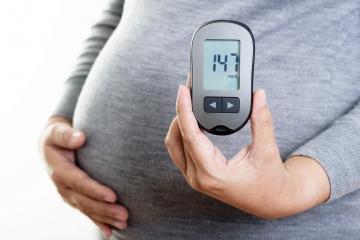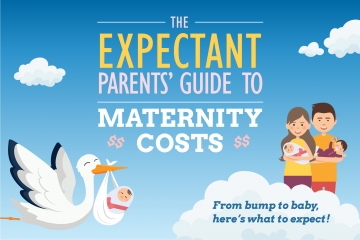
 Gestational Diabetes and Your Secret Weapon to Lowering Blood Sugar Levels
Gestational Diabetes and Your Secret Weapon to Lowering Blood Sugar Levels  How Much Does it Cost to Have A Baby in Singapore?
How Much Does it Cost to Have A Baby in Singapore?  Your Essential Third Trimester Doctor's Visit Checklist
Your Essential Third Trimester Doctor's Visit Checklist  Shield Baby from Whooping Cough!
Shield Baby from Whooping Cough!  Can I still breastfeed during pregnancy?
Can I still breastfeed during pregnancy? 
Pregnant or soon-to-be pregnant ladies generally have a lot of questions and worries on their mind, especially so if it’s your first time!
We’ve come up with some general tips and recommendations for you on what to do throughout your trimesters to help your ease a few of those worries. Always consult your doctor if you have any further questions about pregnancy!
Throughout The Trimesters
1. Keep Yourself Active
Do some stretches every once in a while – they prevent your muscles from tightening and will make you feel much more relaxed. Going for a short walk (around 10 to 20 minutes) can actually help boost your energy levels! And if you were fairly active before your pregnancy, going for brisk walks of 20 to 40 minutes is recommended. But remember to keep hydrated during your walk, which brings us to…
2. Drinking lots of fluid
In general, you should drink around 2.5 litres of fluid per day. That’s right, fluid, not simply water! You can keep yourself hydrated with water, milk, fruit, vegetables, and yogurt. Remember that everyone is different, so drinking more or less is normal. It’s better to pay attention to the colour of your urine – a dark coloured or cloudy urine means you need to drink more, and clear or pale coloured urine means you’re drinking enough.
3. Quit Smoking And Drinking Alcohol
Nicotine and alcohol are bad for babies and yourself (but it’s more important now that you’re carrying a life), and whatever you consume, they’ll go straight to baby as well. Smoking increases your risk of miscarriage, premature and still births, and it also slows foetal growth. Alcohol raises the chance of low birth weight, and could cause problems your baby’s learning abilities.
4. Reduce Caffeine Intake
High caffeine consumption could lead to miscarriage and other problems during pregnancy. At most, you should consume less than 200mg per day. It may be difficult as we generally drink quite a bit of coffee every day, but it’s doable!
Also read: How Much Caffeine Can You Drink When Pregnant
5. Pay Attention To What You Eat
You should avoid these foods that could contain bacteria or parasites:
6. Stock Up On Healthy Snacks
You never know when you’re going to get the munchies, and having a stash of healthy, nutritional snacks literally at hand will help you out. Munching on plain snacks like crackers might also be able to help with morning sickness.
7. Prenatal Depression
Stress, hormonal changes, and discomfort during pregnancy could lead to prenatal depression. According to studies, around 7 to 20 percent of women experience prenatal depression in varying degrees.
If you feel like you could possibly be suffering from prenatal depression, please voice out to your loved ones and get help for yourself and your baby.
8. Let’s Talk About Sex
Having sex while you’re pregnant is safe for the baby, and it can help you and your partner keep the bonds of attraction and intimacy going. You two might have to get a bit more creative in the third trimester, but it’s still doable! Consult your doctor if you’re worried about any complications that might affect sex.
9. Be Kind To Yourself
Give yourself some loving too! Pamper yourself with a massage, go for a manipedi, have a nice dinner out, or do something you love. If you’re feeling down, talk things out with a close friend or your partner – remember, communication is a two way street.
Continue reading on page 2 for the first trimester checklist...
First Trimester
1. Financial Planning
Okay, this is dry and daunting, but it’s something that we have to do. New financial responsibilities will come up, and you’ll have to consider these items: life insurance, setting up a will, having a savings and educational plan for your child, getting health insurance for your child, and budgeting yourselves. Look into the Baby Bonus and Child Development Account as well.
Also read: Costs of Delivery In Singapore: Private Vs Public And How Much Can You Claim From Your Medisave
2. Prenatal Vitamins
It’s difficult to get all the nutrients for you and your baby, even if you eat a wide variety of food! Prenatal vitamins ensure that mums are able to get enough critical nutrients during their pregnancy – folic acid and iron are the highlights of these vitamins as pregnant women usually don’t get enough from food alone.
Getting enough folic acid reduces the risk of neural tube defects such as spina bifida and anencephaly. For iron, it’ll help mums avoid iron-deficiency anaemia, which cuts their risk of premature births and low birth weight.
3. Schedule A Prenatal Appointment
Mums-to-be usually see their healthcare provider at around 8 weeks, but it’s always better to book an appointment in advance. Get any questions that you have ready for your healthcare provider and find out the medical histories of both sides of your families, as they’ll want to know more about that.
4. New Underwear, More Comfort
Your breasts might go up one or two more sizes, and a good maternity bra will definitely help you out with giving extra support and comfort. Some comfy undies will also give you a bit of relief as your abdomen expands.
5. Morning Sickness
The dreaded morning sickness! Some mums get it bad, some barely even have it, but most mums suffer from it frequently enough. Unfortunately, the ‘morning’ part is generally a lie as pregnant mums can feel nauseous throughout the day.
Eating small but frequent meals and snacking throughout the day, and eating bland-tasting food could help with easing the nausea (like those crackers I mentioned earlier). Talk to your healthcare provider about anti-nausea medication that’s safe to take during pregnancy.
Continue reading on page 3 for the thirs trimester checklist...
Second Trimester
1. Moisturise Your Belly
You’re going to get stretch marks, and that’s all right. The moisturisation is more for getting rid of that itchiness that you’ll start feeling soon enough!
2. Learn To Sleep On Your Side
To reduce swelling and improve blood flow to your placenta, you should start sleeping on your left side. To make sleeping on your side more comfy, try placing a pillow between your legs, behind your back, or under your hips.
3. Sign Up For Childbirth Classes
They’re about as close as you can get to actually giving birth, so you and your partner can learn some important lessons from it. Register early for a childbirth class to ensure a spot! You and your partner will learn about pain management, the process of labour and birth, and much more.
4. Talk To Your Older Children
Find out what they think about having a new sibling, and show them that they’re still and will still be loved by you. Get them used to the idea of a new brother or sister and see what they’ll be able to do to help you prepare!
5. Maternity Leave
Now’s a good time to start planning your maternity leave – check with your HR department, complete the paperwork, and find out your benefits. You’ll need to understand the process of going on maternity leave and if (touch wood) any complications arise in your pregnancy. Work-wise, plan out your handovers to your colleagues in advance.
Also read: Maximising Your Maternity Leave: How To Calculate And When Should You Start
6. Childcare Options
Singapore is a busy, busy city, and you might not have enough time to care for your baby when your maternity leave is up. Your best option would be to have your parents look over our little ones while you’re at work, but if that’s not possible, you should do a comprehensive review of childcare centres.
Also read: Pros & Cons: Childcare Vs Foreign Helper Vs Nanny Vs Your Parents
7. Don’t Forget To Be Yourselves
Spend some quality time with your partner! You two have a bit more free time now, so make the most of those precious moments. Watch a movie together, eat at your favourite restaurant, go for a walk while holding hands, and do things that show your appreciation for each other.
Continue reading on page 4 for the third trimester checklist...
Third Trimester
1. Gear Up
Get your strollers, carriers, diapers, cribs, and baby monitors ready because your little one’s going to be needing all those essentials soon! Do some research on what you’ll need and compare the different brands. Join a Facebook page that’s for mums and tap on their collective experience. Check with your friends who have kids – they may have some hand-me-downs that you can ask for!
2. Baby-Ready Your Home
From the first point, getting the baby stuff is just the beginning. Now you’ll have to ensure that they’re all set-up properly! Make sure that baby’s nursery is a peaceful and quiet area that doesn’t have bright lights over their crib. Keep it as uncluttered and accessible as possible, but remember that you’ll probably have to move stuff around after baby is around, as you’ll discover your own best way to care for baby.
3. Prepare For Breastfeeding
Find out about the benefits of breastfeeding, and read articles to learn more about it – the do’s and don’ts of nursing your baby, how to get your breastmilk flowing, etc. Look for groups who are willing to contribute frozen breastmilk if you’re unable to produce enough breastmilk in your first few days after birth, as that might happen to some mums.
4. Talk To Your Baby Bump
Your child can hear and recognise your voice at this point, and talking to them will help the two of you bond. It doesn’t have to be anything specific – you could be reading a book out loud, or narrating what you’re currently doing, or even singing a song!
5. Stock Up On Supplies
After baby is born, you’ll probably have a hectic time taking care of baby, which means you won’t really have time to buy groceries and household supplies like toilet paper, sanitary pads, soap, shampoo, and other daily essentials. So stock up on them, unless you have a helper that can do so on your behalf.
6. Make Entertainment Easily Accessible
For you, not for the baby! Prepare a lengthy list of shows, books, songs that are easily accessible for you after baby has arrived. You’ll thank your past self for doing so.
7. Prepare Yourself For Labour
It’s easier said than done – labour is something that has to be experienced in order for you to truly understand what it’s about, and every woman’s pain that they go through is different. But a certain amount of mental preparation can be done – learn about pain medication during childbirth or if you’d prefer a natural birth. Consider your options and plan accordingly.
Learn more about the 3 stages of labour – which could last from 8 to 20 hours. If this isn’t your first child, your labour period should be a lot quicker than before.
And that’s all the time that we have for today, ladies! Keep these lists at hand during your pregnancy, stick them on your fridge or softboard, and they’ll help you out.
For more pregnancy and childcare tips, subscribe to our mailing list and like us on Facebook, to receive new articles for mummies like you every week!
Copyrighted Pregnancy & Baby by Mummys Market 2019


